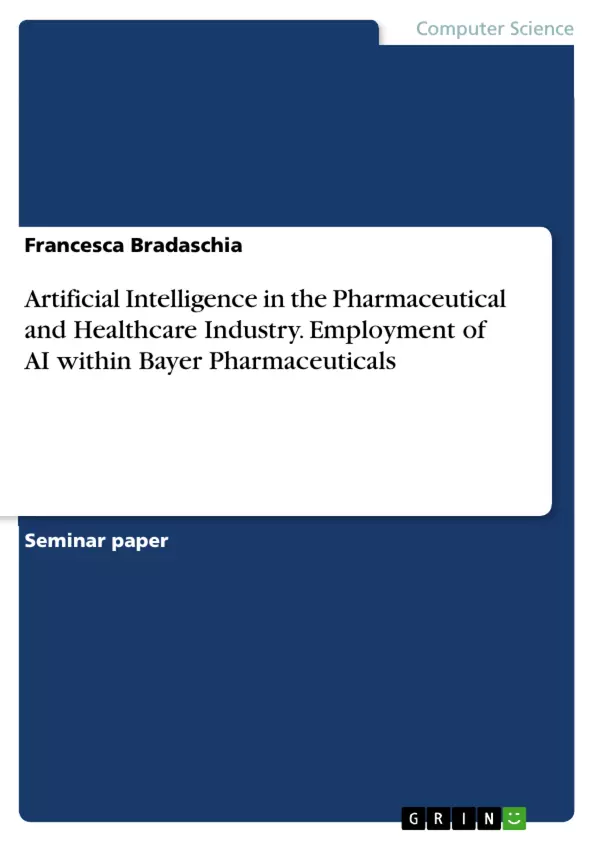During the past years, a continuously increasing number of corporations have decided to adopt Artificial Intelligence (AI) systems to improve their efficiency and reduce costs. This research paper aims to analyse the rise, applications, and developments of AI in the pharmaceutical and healthcare industry. Specifically, the employment of AI within the German multinational Bayer Pharmaceuticals is discussed, and further implementation suggestions are outlined.
Furthermore, current opportunities, such as epidemic outbreak predictions and image recognition platforms for medication ingestion tracking, and challenges, for example legal issues and ethical challenges, are examined. The future role of AI systems in the pharmaceutical and healthcare industry can hardly be anticipated. Nevertheless, thus far these systems have represented a unique and tremendous asset within societies and companies, and it is most likely that in the course of time their role will be of always greater importance.
Nowadays, organizations are defined by higher complexity, changing client demands, increased competition and adoption of new technologies. On the path towards an increased digitalization of economies and societies, the management of information and of knowledge, and the way people connect, collaborate and learn are drastically changing. As more and more possibilities for disruptive change are offered by digitalization, individuals and organizations need to redesign their leadership, innovation, knowledge processes and information practices.
Inhaltsverzeichnis (Table of Contents)
- 1 Introduction
- 2 Artificial Intelligence
- 3 Bayer Pharmaceuticals
- 4 Analysis
- 4.1 Implementation of Artificial Intelligence Systems at Bayer Pharmaceuticals
- 4.2 Opportunities
- 4.3 Challenges
- 5 Conclusion and Outlook
Zielsetzung und Themenschwerpunkte (Objectives and Key Themes)
This research paper aims to examine the integration of Artificial Intelligence (AI) within the pharmaceutical industry, specifically focusing on Bayer Pharmaceuticals. It explores the rising prominence of AI in this sector, investigates its applications and potential developments, and analyzes the advantages and disadvantages of its implementation.
- The rise and significance of Artificial Intelligence in the pharmaceutical and healthcare industry.
- Implementation and application of AI systems within Bayer Pharmaceuticals.
- Opportunities presented by AI, including epidemic outbreak predictions and image recognition platforms for medication ingestion tracking.
- Challenges associated with AI implementation, including legal and ethical issues.
- Future role and implications of AI systems in the pharmaceutical and healthcare industry.
Zusammenfassung der Kapitel (Chapter Summaries)
The paper begins by introducing the increasing complexity and digitalization in modern organizations, highlighting the need for innovative solutions like AI. It then defines Artificial Intelligence and its application in the pharmaceutical and healthcare sector, emphasizing its versatility and efficiency in enhancing data processing, accelerating procedures, and creating new knowledge.
Chapter 3 provides a background on Bayer Pharmaceuticals, outlining its history, mission, and diverse divisions. It emphasizes the company's commitment to research, development, and marketing of innovative medicines.
Chapter 4 delves into the implementation of AI systems at Bayer Pharmaceuticals. It discusses ongoing pilot projects and partnerships with AI-focused firms, like Cyclica and Exscientia. The chapter explores the use of AI software for pattern recognition in specific medical conditions, such as CTEPH.
Schlüsselwörter (Keywords)
This research paper focuses on the themes of Artificial Intelligence, its application within Bayer Pharmaceuticals, and the evolving dynamics of research and development in the pharmaceutical industry. It explores the potential of AI to revolutionize drug discovery, improve patient care, and address emerging challenges in healthcare.
- Arbeit zitieren
- Francesca Bradaschia (Autor:in), 2021, Artificial Intelligence in the Pharmaceutical and Healthcare Industry. Employment of AI within Bayer Pharmaceuticals, München, GRIN Verlag, https://www.grin.com/document/1012601



